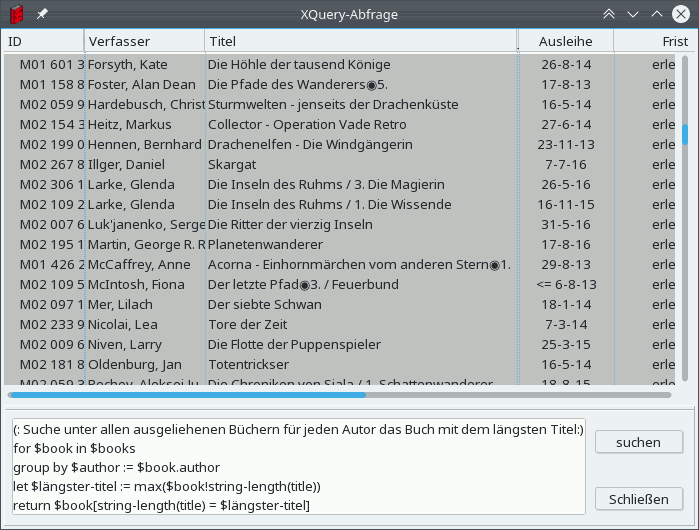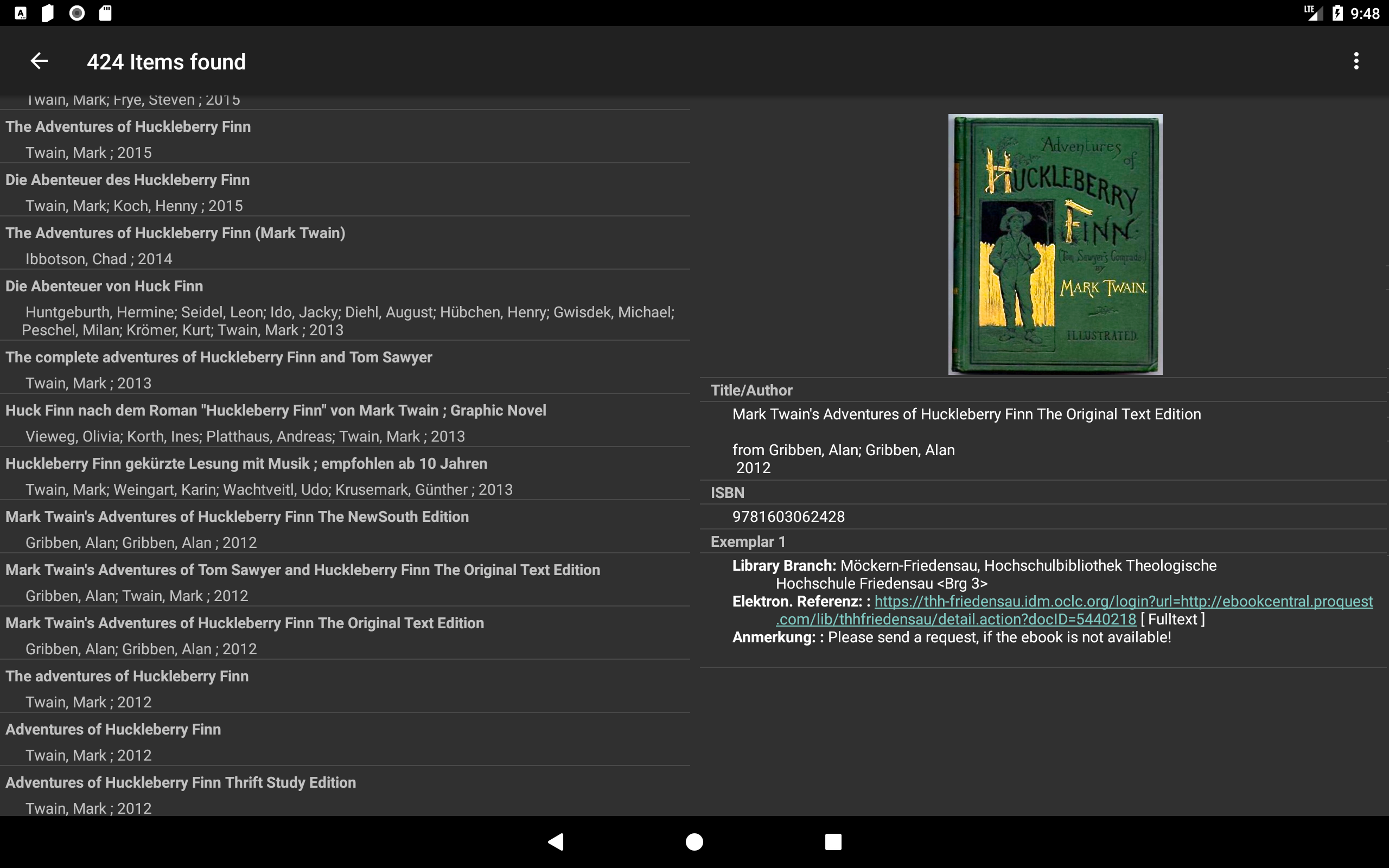1. Büchereibeschreibung
In diesem Schritt gibt man allgemeine Informationen über die jeweilige Bücherei ein.
Verwendet die Bücherei ein bereits in VideLibri registriertes Bibliothekssystem, kann dies durch Beantworten der Fragen in der GUI erfolgen. Ansonsten muss man die internen XML-Dateien bearbeiten.
Beschreibung für ein bereits unterstütztes System über die GUI
Desktop-Version
In der Desktop-Version klickt man dazu nacheinander auf "Extras / Einstellungen / Büchereien / Neue Bibliothek hinzufügen".
Im seltenen Fall, dass die Bücherei ein eigenes VideLibri-Template zur Verfügung stellt, kann man nun auf "Ja" klicken und die URL des Templates eingeben. Alles weitere geschieht automatisch (d.h. der restliche Text in dieser Hilfe ist nicht relevant).
Gibt es dagegen kein Template mit fertigen Metadaten, klickt man auf "Nein" und beantwortet die darauf folgenden Fragen zum Namen der Bibliothek und des verwendeten Systems. Dabei wird eine Liste aller installierter Systeme angezeigt.
Jedes System-Template benötigt eigene Variablen, die anschließend der Reihe nach abgefragt werden. Die meisten Systeme benötigen die Adresse des Bibliothekskatalog, so fragt zum Beispiel das "sisis"-System nach einem "server" mit Protokoll, wo man dann beispielsweise http://sisis.bibliotheks-server.de eingeben muss.
Nachdem alle Fragen beantwortet wurden, erstellt VideLibri automatisch das dazugehörige XML und zeigt es an. Es wird allerdings erst gespeichert, wenn man auf "Bibliothek speichern" klickt. Anschließend kann der Dialog geschlossen werden.
Android-Version
In der Android-Version findet man diese Konfigurationsmöglichkeit unter "Einstellungen / Neue Bibliothek registrieren".
Im seltenen Fall, dass die Bücherei ein eigenes VideLibri-Template zur Verfügung stellt, kann man die URL im ersten Feld eingeben und auf "installieren" klicken. Alles weitere geschieht wie bei der Desktop-Version automatisch (d.h. der restliche Text in dieser Hilfe ist nicht relevant).
Gibt es dagegen kein Template mit fertigen Metadaten, muss man die darunter liegenden Felder ausfüllen.
D.h. die Id (welche nicht wirklich relevant ist, aber man darf jede Id nur einmal verwenden), den Namen der Bibliothek und den Namen des System. Nachdem man ein System ausgewählt hat, werden die Felder für die Variablen des System angezeigt, wobei jedes System eigene Variablen hat.
Zum Beispiel benötigen die meisten Systeme die Adresse des Bibliothekskatalog und das "sisis"-System hat beispielsweise eine "server"-Variable mit Protokoll, wo man dann eine Adresse wie http://sisis.bibliotheks-server.de eingeben muss.
Beschreibung durch Bearbeitung der XML-Dateien
Desktop-Version
Der einfachste Weg eine neue Bibliotheks-XML einzugeben, ist auf "Extras / Einstellungen / Büchereien" zu klicken und die XML im oberen Feld einzugeben. Dann kann man einfach auf "Bibliothek speichern" klicken, und die Bibliothek ist registriert (dafür muss man aber zuerst das Template von Punkt 2 erstellen, was ebenfalls im Dialog mit dem unteren Feld möglich ist).
Die XML-Dateien zur Beschreibung einer Bibliothek haben folgendes Format:
<?xml version="1.0" encoding="UTF-8"?> <library> <longName value="Hier den Namen der Bibliothek eintragen"/> <shortName value="Hier den abgekürzten Namen"/> <template value="hier den Namen des Templates"/> <!-- die folgenden Elemente sind optional und können üblicherweise weggelassen werden--> <variable name="server" value="hier die URL ihres Webkatalogs. (abhängig vom gewählten Template)"/> <homepage value="Hier die Adresse der Bücherei Internetseite"/> <catalogue value="Hier die Adresse der Bücherei Katalog-Internetseite"/> <username matches="^regulärer Ausdruck, der den Benutzernamen überprüft$"/> <password matches="^regulärer Ausdruck, der den Benutzernamen überprüft$"/> <maxExtendCount value="maximale Anzahl der erlaubten Verlängerungen"/> </library>
Entspricht der Katalog dem einer bereits unterstützten Bibliothek, so kann für template den Namen aus der xml-Beschreibung dieser Bibliothek übernehmen, ansonsten wählt man einen neuen, beliebigen Namen und erstellt ein neues Template mit dem gewählten Name.
<variable> definiert eine Variable mit dem angegebenen Variablen und Namen. Welche Variablen verwendet werden, hängt vom Template ab. Man kann in der Templatedatei libraries/templates/(Der Template-Name)/template nachschauen, welche benötigt werden. Meistens reicht eine server Variable.
Falls die Bücherei in der digibib vertreten ist, kann man
<variable name="location" value="Ort"/> <variable name="view" value="View"/> <variable name="searchid-digibib" value="Digibib Suchid, wie: SERVICEGROUP1.SERVICE.SEARCH_SBDUE"/>verwenden, um mit der Mediensuche in ihrem Katalog beliebige Bücher zu suchen.
Als Zeichensatz darf man in dieser Datei nur normales Windows-1252 (ANSI) und UTF-8 verwenden.
Abgespeichert werden diese Dateien im Verzeichnis data\libraries (im Programmverzeichnis bzw. Lokalen Anwendungsdateien unter Windows und /usr/share/videlibri bzw. ~/.config/VideLibri unter Linux für mitgelieferte bzw. neu-erstellte Dateien), und der Dateiname sollte dem Format LAND-BUNDESSTAAT-STADT-BIBLIOTHEK.xml folgen.
Zudem müssen alle im globalen Verzeichnis in der libraries.list eingetragen werden, und über die GUI Benutzer-erstellte in der user.config Datei (ersteres ist einfacher, letzeres macht die GUI automatisch).
Android-Version
Im Prinzip verwendet die Android-Version dieselben XML-Dateien wie die Desktop-Version. Allerdings sind diese im APK eingeschlossen, so dass die mitgelieferten Dateien nicht bearbeitet werden können.Es gibt aber ein alternatives Verzeichnis
/data/data/de.benibela.videlibri/files/libraries, in dem neue XML-Dateien angelegt werden können und die dann wie in der Desktop-Version geladen werden. Dies ist allerdings nur auf gerooten-Geräten modifizierbar.


